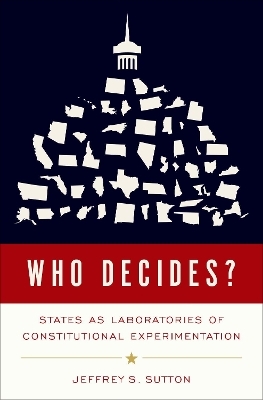
Who Decides?
Oxford University Press Inc (Verlag)
978-0-19-758218-3 (ISBN)
Everything in law and politics, including individual rights, comes back to divisions of power and the evergreen question: Who decides? Who wins the disputes of the day often turns on who decides them. And our acceptance of the resolution of those disputes often turns on who the decision maker is-because it reveals who governs us.
In Who Decides, the influential US Appellate Court Judge Jeffrey S. Sutton focuses on the constitutional structure of the American states to answer the question of who should decide the key questions of public policy today. By concentrating on the role of governmental structure in shaping power across the 50 American states, Sutton develops a powerful explanation of American constitutional law, in all of its variety, as opposed to just federal constitutional law. As in his earlier book, 51 Imperfect Solutions, which looked at how American federalism allowed the states to serve as laboratories of innovation for protecting individual liberty and property rights, Sutton compares state-level governments with the federal government and draws numerous insights from the comparisons. Instead of focusing on individual rights, however, he focuses on structure, while continuing to develop some of the core themes of his previous book.
An illuminating and essential sequel to his earlier work on the nature of American federalism, Who Decides makes the case that American Constitutional Law should account for the role of the state courts and state constitutions, together with the federal courts and the federal constitution, in assessing the right balance of power among all branches of government. Taken together, both books reveal a remarkably complex, nuanced, ever-changing federalist system, one that ought to make lawyers and litigants pause before reflexively assuming that the United States Supreme Court alone has the answers to our vexing constitutional questions.
The Honorable Jeffrey S. Sutton serves on the United States Court of Appeals for the Sixth Circuit. Judge Sutton was a partner with the law firm of Jones Day and served as State Solicitor of the State of Ohio. He also served as a law clerk to the Honorable Lewis F. Powell, Jr. (Ret.), the Honorable Antonin Scalia, and the Honorable Thomas J. Meskill. He is the author of 51 Imperfect Solutions (OUP 2018).
Preface
Introduction
Part I: The Judicial Branch
1 Umpiring and Gerrymandering
2 Judicial Review: Democracy and Duty
3 Judicial Selection: How to Use Democracy to Select Individuals for a Non-Democratic Job
4 Are You a Territorial Judge or a Territorial Lawyer?
Part II: The Executive Branch
5 One Chief Executive or Many?
6 Administrative Law: How to Write and Implement Our Laws?
Part III: The Legistlative Branch
7 State Legislatures and Distrust: Clear-Title and Single-Subject Requirements
8 Trying to Make Legislatures More Representative
Part IV
9 Local Governments
Part V
10 Amending Constitutions to Meet Changing Circumstances
Epilogue
Appendix
Notes
Index
| Erscheinungsdatum | 19.10.2021 |
|---|---|
| Verlagsort | New York |
| Sprache | englisch |
| Maße | 241 x 163 mm |
| Gewicht | 839 g |
| Themenwelt | Recht / Steuern ► Allgemeines / Lexika |
| Recht / Steuern ► EU / Internationales Recht | |
| Recht / Steuern ► Öffentliches Recht | |
| Recht / Steuern ► Privatrecht / Bürgerliches Recht | |
| Sozialwissenschaften ► Politik / Verwaltung ► Staat / Verwaltung | |
| ISBN-10 | 0-19-758218-4 / 0197582184 |
| ISBN-13 | 978-0-19-758218-3 / 9780197582183 |
| Zustand | Neuware |
| Informationen gemäß Produktsicherheitsverordnung (GPSR) | |
| Haben Sie eine Frage zum Produkt? |
aus dem Bereich


